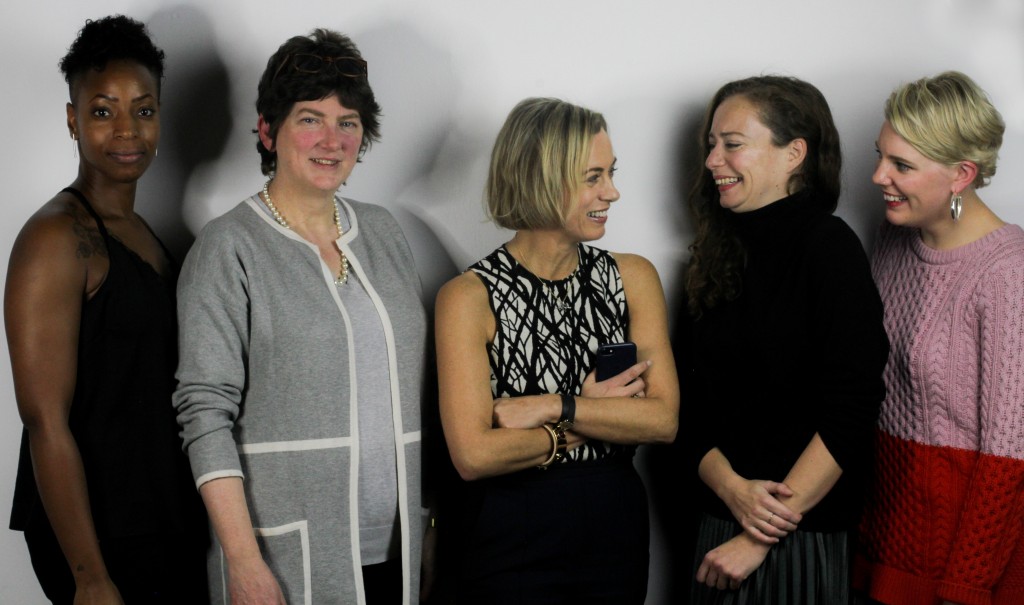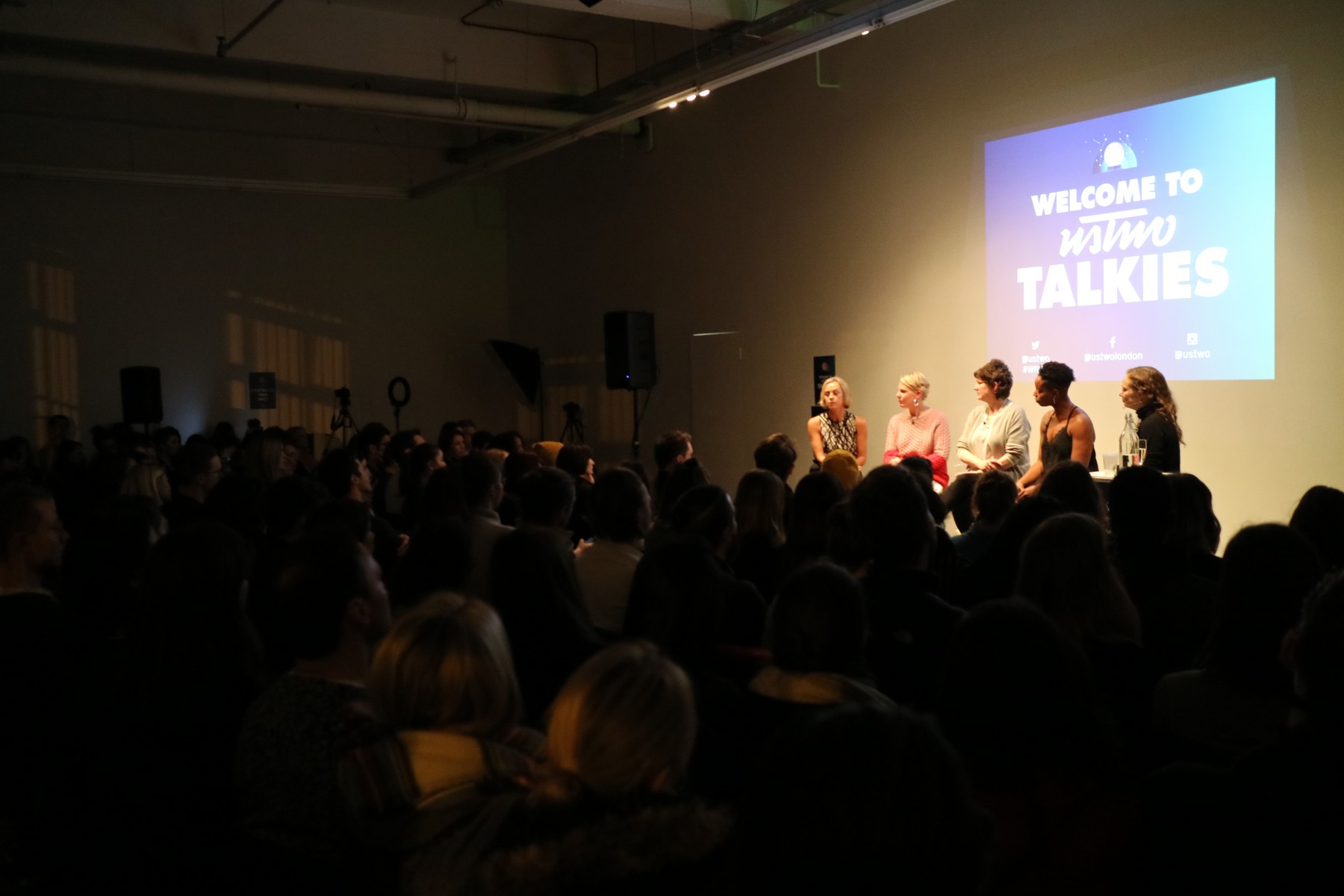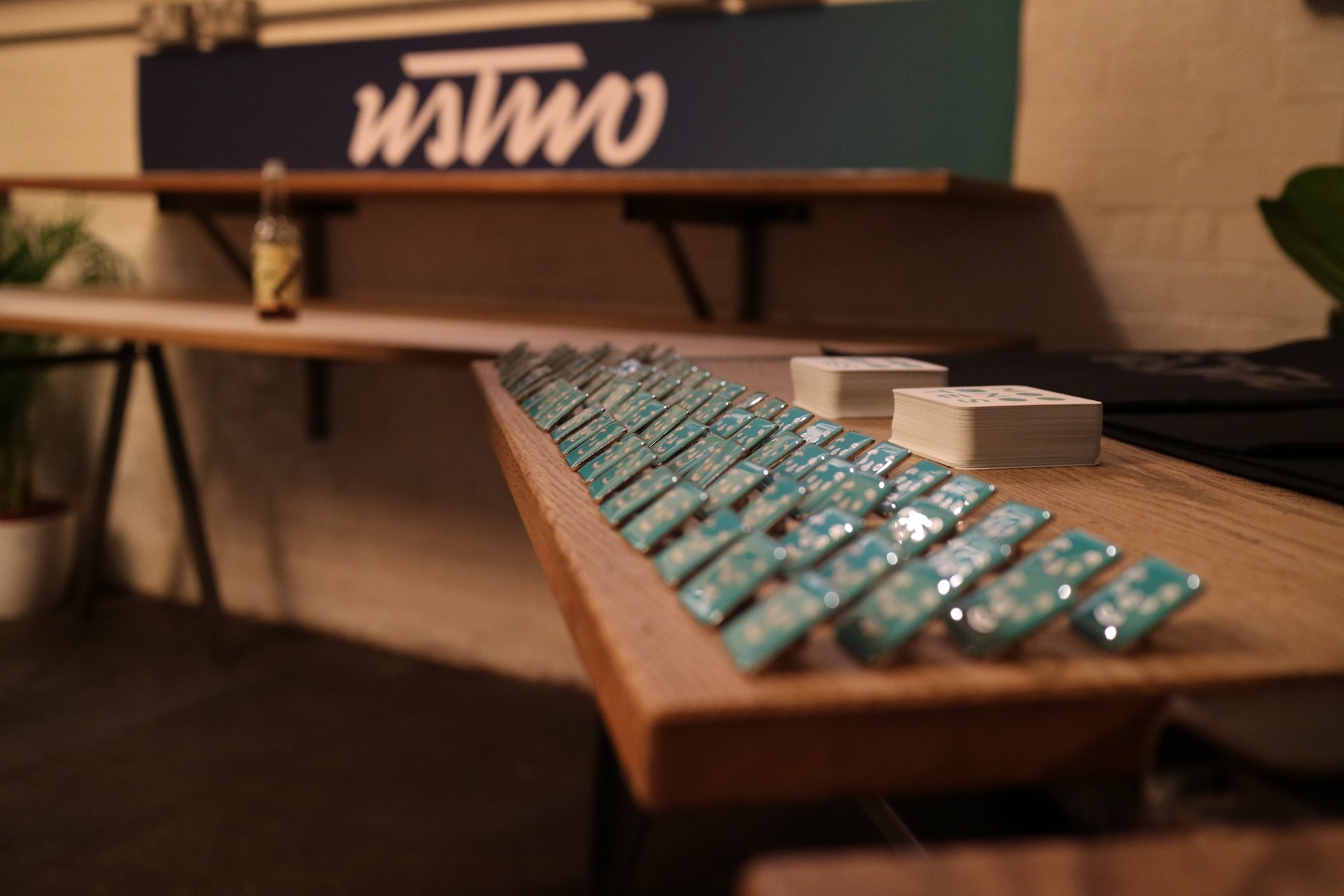On the evening of Thursday 1st December, we migrated a whole 416.7 ft from our own front door over to Protein Studios to host our latest ustwoTALKIES, ‘What I Wish I’d Known’. This was a supercharged panel event with inspiring speakers dishing out career advice, exclusive event swag, a LinkedIn headshot service and plenty of drinks courtesy of Victory Gin, Diageo and Desk Beers.
Whilst this event was, in part, an opportunity to bring together inspiring, successful women – it was also a chance to have a frank discussion about women in the workplace and tap up these experienced leaders for some no-bullshit advice. Being told ‘you can be whatever you want to be’ is all well and good, but it’s not that helpful when it comes to negotiating your contract or approaching someone to be your mentor.
There is clearly an appetite for unreserved discussion in this space – by the time the panel kicked off, we were officially standing room only. And thanks to our audiences’ energetic social media action, we trended on Twitter with #wiwik – relive the evening's best quotables here!
After an introduction from Nanci Veitch, our events organiser extraordinaire, we welcomed our panel and moderator, Nicki Sprinz, to the stage. She was joined by founder Mo White, social entrepreneur Nat Campbell, Working Families CEO Sarah Jackson and blogger-turned-author Emma Gannon.

Finding a Mentor
So, with different industries, backgrounds and lifestyles represented onstage we were set for an exciting exchange of ideas on what career success looks like, how to get there and how to sustain it. The very first topic of conversation – the start of our panelists’ working lives – really crystallized the breadth of experience on display.
A key take-away from these inspiring women’s stories is the diversity of ways each of them started out. No-one suggested they had taken a fail-safe path to success, rather emphasised they are the sum of their experience. Emma spoke about how, over time and through her experience, the idea that it’s a death blow to your career to work anywhere less than a year has become ridiculous. She finds value in working on a project-by-project basis – it’s a model that aligns with her multi-faceted career allowing her to incrementally develop when she takes on a new piece of work, be that a speaking engagement, podcast or new book.
When it came to the topic of role-models, our panelists had some reservations about the hierarchical connotations of the term. Whilst Nat has diverse role models, from Rihanna to Michelle Obama, she also sees her relationship with her mentees as fulfilling a similar function to that of role-modeling. These young girls ‘hold a mirror’ up to her, allowing her to reflect in a space free from pressure and expectations of the entrepreneur world. Sarah was explicitly exasperated at the tendency to correlate ‘a female role-model’ to the unrealistic projection of a woman ‘who has it all’. Instead, she encourages us to use authenticity as a measure of worth – find inspiration in real people who are making change happen.

Negotiating Your Wage
The next topic was one that continues to be stigmatised but is incredibly, materially important – how to negotiate your wage. Asking for a raise can be hard, especially for women who are also grappling with the gender pay gap in doing so. Our moderator Nicki started the conversation with Cindy Gallop’s advice to start any negotiation with the highest number you can say out loud without laughing and working backwards from there. However, from our panelists we got a more nuanced approach to negotiating. Mo, for example, sees that there are other contractual dimensions – shorter hours, more holiday, flexible working – that could be just as valuable as having a higher wage.
No panelist attempted to deny the awkward nature of these discussions and offered their own hacks to deal with them - Mo ‘talks fast’ whilst Nat says ‘try not to bristle so much’. For Emma, the tension that this creates with other colleagues is also a legitimate issue. However, this is a tension that is unavoidable in a climate that shames women for asking for more and where we aren't transparent with each other – these are both things that we can actively undermine in our own workplace experiences.
During the Q&A portion of the evening, this topic was pushed further when an audience member pointed out that the topic had been discussed without mentioning any actual numbers. A fact that is illustrative of pervasiveness of this taboo and how far we have to go to fully undermine it.

Work-Life Balance
One of the most divisive topics discussed was the question of work-life balance. It soon became clear that how an individual defines ‘balanced’ is both contextual and personal. Nat, while critical of the ‘bravado’ and burn-out that is part and parcel of start-up culture, says there are points where she fully commits herself to work. For example, when she is working on boards and dealing with public money, she feels this is work important enough to compromise her ‘balance’ for.
However, Sarah was quick to point out that this is literally not an option when you are a parent – ‘When you have a child you can’t send a text message saying you will be back in three months’. For Sarah, the particular demands on parents and carers are often not fully considered when it comes to diversity and inclusion initiatives. Companies need to pay attention to this group in order to fully benefit from a diverse and thriving workforce – one way she suggests we can go about this is start talking about a ‘work-life fit’ rather than a ‘work-life-balance’.
With an evening of such lively and engaging discussion, and with each panelist bringing such unique perspective, it’s surprisingly easy to distill a thematic message: outdated workplace conventions and unrealistic expectations, of both yourself and others, need to be done away with. Not only can you be successful in spite of these challenges, you can also achieve so much by – collaboratively – overcoming them.
For more ‘What I Wish I’d Known’ inspiration watch the entire panel discussion below or check out our blog.
Embedded content: https://vimeo.com/194826291
More on our panel
Natalie Campbell – Social Entrepreneur
Natalie Campbell is a social entrepreneur, author and business coach. She co-founded A Very Good Company, a social innovation consultancy, whose vision is to create a world where people can feel good, do good and live better.
Morwenna White – Founder
From starting out as a stylist at Tristan Webber, to years as a fashion editor and moving into ecommerce with her work at NET-A-PORTER, Mo has had a vibrant career working on various intersections of the fashion industry. More recently, she has set up her own business.
Sarah Jackson OBE – CEO
Sarah Jackson is the CEO of Working Families and has led work-life balance campaigning and culture change for over twenty years. Sarah has worked across the political spectrum to push for positive change including the right to request flexible working, maternity and paternity leave and fathers’ rights at work. In 2007, Sarah was awarded an OBE for services to Quality of Life Issues.
Nicki Sprinz - Business Director, ustwo - Moderator
Nicki Sprinz is Business Director of ustwo London and co-founder of Ada’s List, a community designed to support women working in the tech industry. She started out in journalism and took a meandering path, via working in NHS health information, to working in tech.
Emma Gannon – Blogger and Author
Emma is a born multi-disciplinarian who has worked extensively in Digital Strategy and Journalism. Currently, she is a contributing writer for the likes of The Guardian and Glamour, a guest lecture at The Condé Nast College of Fashion & Design, runs her own blog, hosts a podcast and, in July 2016, published her first book CTRL ALT DELETE: How I Grew Up Online.